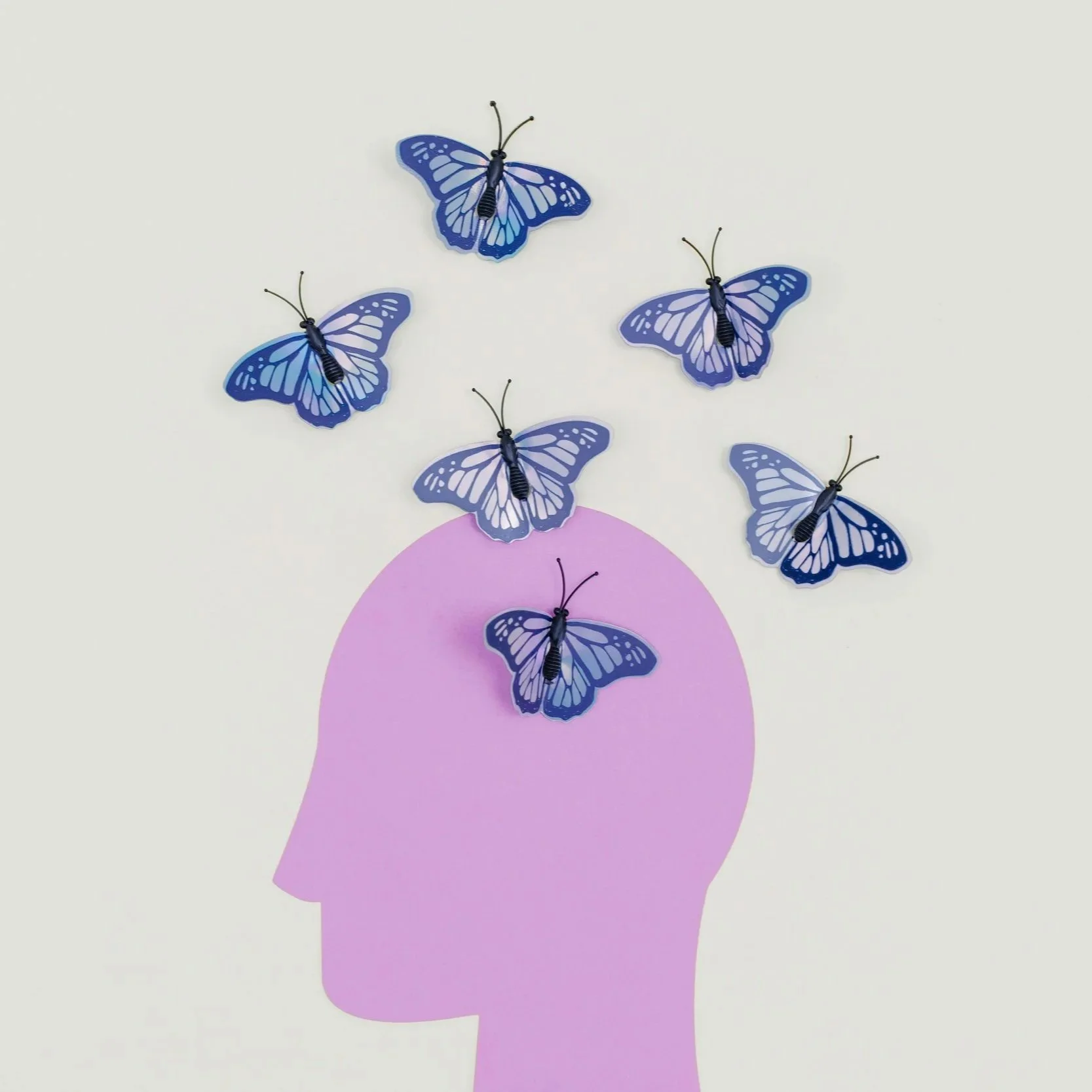Do You Have to Process Every Trauma in Your Life with EMDR Therapy To Feel Better?
Most trauma is complex. We often experience a series of related traumas, or experiences that are thematically linked. These themes may be loss, death, abandonment, or something more nuanced like realizing the adults taking care of you were not doing a good enough job. These themes create complex trauma networks. When considering EMDR therapy, clients often wonder if they need to process every traumatic event in their life with EMDR to feel better. The possibility is overwhelming, and may put some people off pursing trauma therapy. So do you need to process every single traumatic incident to feel better? The answer is simple: no, you don’t have to process everything. Here's why.
EMDR therapist Alexis Harney, LMFT, listening to a client go through their trauma history in preparation for EMDR processing.
The Interconnectedness of Trauma
Think of your past negative experiences with a similar theme as a line of dominoes placed upright. Sometimes all it takes is knocking the right one down to take out the whole line. With EMDR therapy, sometimes identifying the earliest or most intense incident processes the whole chain. These pivotal moments create a chain reaction that leads to profound healing, eliminating multiple layers of trauma.
Here’s what that looks like, practically. Let’s say a woman named Flora has experienced a lot of medical trauma. There are hundreds of potential memories for her to process in EMDR therapy. In working with a skilled EMDR therapist, she identifies one memories that feels most gutting and most representative of her overall experience: being dismissed by a doctor she waited six months to see. Though there were many incidents of her feeling frustrated with the medical system, processing that single target offered her significant relief.
EMDR therapy doesn’t require you to relive every single painful incident. Finding those key memories or experiences that are holding you back and targeting them with EMDR can lead to significant relief. Once we target those pivotal moments, clients often experience a sense of relief, as if the weight of many past events has been lifted. It's not instant and certainly doesn't happen in a single or handful of sessions. But it can absolutely be done. As trauma therapists, we've seen it happen many, many times.
How Does the Brain Store and Map Trauma?
When we experience an event, the brain stores that information in the hippocampus, which is responsible for memory. During traumatic events, the brain's typical process of storing information is interrupted. The emotional intensity of the trauma can overwhelm the brain's ability to process and store the event properly. As a result, the memory is not stored in a way that is easy to integrate. It’s often stored in the amygdala, the part of the brain responsible for processing emotions and fear.
This creates a situation where the memory isn’t fully processed. It's stuck in the wrong part of the brain because your brain believes a different type of access to it will protect you. The emotional charge from the trauma can get reactivated whenever something similar happens in the present. For example, someone who lost their house in the Los Angeles wildfires may have a physical reaction to the smell of smoke, even if it's contained in a campfire. The memory doesn’t get connected to the larger story of your life, and instead, it remains in a fragmented, heightened state.
How EMDR Therapy Helps You Process Trauma
The R in EMDR stands for Reprocessing. Through bilateral stimulation (like side to side eye movements or taps), EMDR activates the brain’s natural healing ability. The bilateral stimulation helps the brain reconnect with the memory and process it in a more integrated way. It allows the brain to move the memory from the amygdala, where it is stuck with all its emotional intensity, into the neocortex, the more logical part of the brain.
A person that experienced a car accident can be sitting at home, perfectly safe, and think about the accident and feel immediate danger. They logically know they are safe, but the trauma memory is stored in the "survival" part of the brain. When a memory is reprocessed and stored correctly, the emotional charge associated with it goes away. It no longer feels intense or disruptive.
Instead of feeling trapped by the past, clients often describe a sense of relief and emotional freedom. The truly feel the event has been properly filed away in a way that no longer affects their day-to-day life. This is the “domino effect” we refer to in EMDR; by processing a few key memories, the brain can organize and integrate other similar memories. This can create massive shifts in how someone feels in their present life.
Processing Key Moments Facilitates Healing
The power of EMDR lies in its ability to target specific memories that are deeply tied to your emotional patterns and behaviors. You don't have to address every traumatic event to experience healing. Often, it’s just about finding the "key memories" that act as gateways to larger emotional shifts. Once these memories are processed, it can have a cascading effect. Emotional responses, habits, and triggers that were previously tied to those memories are changed as well.
Alexis Harney, LMFT
Alexis is a licensed EMDR therapist working with adults and teens in California and Florida. Alexis specializes in working with complex trauma and attachment wounds. She excels at treating people who feel disconnected from their bodies and struggle in relationships as a result of their trauma. As a holistic EMDR therapist, she emphasizes a weighty preparation and resourcing phase to get clients ready for trauma therapy.
For example, a single event like a childhood experience of abandonment could be connected to a deep sense of unworthiness or anxiety as an adult. A common memory we hear about is being forgotten at school and being the only kid left in the pickup line. Processing this memory with EMDR doesn’t just resolve that one event; it helps reduce anxiety in other areas of life. This is because through EMDR, the brain reorganizes all memories around abandonment in a way that no longer affects your emotional state. A traumatic breakup might have triggered not just grief, but also patterns of relationship fear, insecurity, and avoidance. By addressing the memory associated with the breakup, you may find relief from these feelings and behavior patterns in other areas of your life.
How Do You Know Which Memory Is The Right One To Target?
The simple answer is that it’s usually the “first or worst” memory in a series. But identifying these key moments usually requires a skilled EMDR therapist. The brain can be funny in how it sets up those lines of trauma dominoes. While some traumas are obviously connected, others are not so obviously. We don't recommend trying to identify your key trauma memories outside of therapy. Accessing complex trauma networks without the safety and containment of therapy can make you feel a lot worse.
The Power of the Brain's Plasticity
Another reason EMDR can lead to profound changes is the brain's neuroplasticity. Neuroplasticity is the brain's ability to reorganize itself by forming new neural connections. It can do this at any point throughout life. When traumatic memories are processed and integrated, it opens up new pathways for healthier emotional responses and behaviors. This allows you to heal in a way that feels transformative and long-lasting.
By processing trauma, EMDR helps the brain “re-map” the memory so that it no longer has as much grip over you. Think about the last time you went to the grocery store. It probably wasn't memorable, right? While you'll likely always remember the trauma, you can have the same level of emotional reactivity as that grocery store memory. It's something that happened it you and is no longer happening. Instead of it being a constant, overwhelming presence, it becomes just another part of your past, no longer influencing your emotional responses.
EMDR Therapy In San Francisco, Los Angeles, and Throughout California and Florida
If you're curious about how EMDR can help you heal from trauma without having to revisit every painful memory, reach out for a consultation. You don’t need to process everything all at once to start feeling better. Together, we can identify the memories that matter most to your healing journey and start the path toward a more peaceful, balanced life.






















